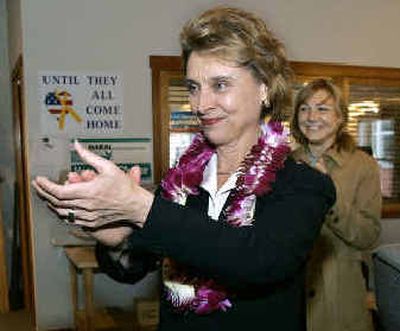Unlikely stalemate continues

OLYMPIA – For months, Christine Gregoire was the clear favorite to win the race for governor.
After all, she’s a Democrat in a state that leans Democratic, and a woman in a state where that’s also a significant political advantage. She has strong Eastern Washington credentials, boosting her appeal on the dry side of the Cascades. And after three terms as state attorney general, she was far better known than her challenger, Republican Dino Rossi.
On Tuesday night, she and a couple of dozen supporters watched the election returns from the 46th-floor Imperial Suite at Seattle’s Westin Hotel.
“You know what?” she later told a ballroom packed with Democrats. “I’m coming back down here as the next governor of the state of Washington! To those that wait, victory is theirs!”
Five days later, everyone’s still waiting. A fourth day of vote-counting showed Gregoire holding a narrower lead Friday night than on Thursday, but election officials say there are still hundreds of thousands of ballots trickling in.
“In politics, expectations are everything,” said Christian Sinderman, a consultant working for the Gregoire campaign. “The bar was set extraordinarily high, and maybe unrealistically.”
What turned an expected political cakewalk into a photo finish? Here are some of the theories:
The gay Libertarian vote: It’s long been conventional wisdom that Libertarian candidates pull more votes away from the right than from the left. This year, however, the Libertarian candidate for governor was Ruth Bennett, a lesbian running largely on a single issue: making same-sex marriage legal. A post-primary poll, Bennett said, suggested that many of her voters were liberal Democrats.
“The objective of all this was to explode the myth that we only take votes from Republicans,” she said.
Now, however, Bennett’s looking a lot like Ralph Nader: someone the Democrats will likely blame if they lose the election. By Friday night, the gap separating Gregoire and Rossi had shrunk to 4,001 votes. Bennett got more than 52,000.
(Under state law, races closer than 2,000 votes trigger a mandatory recount.)
Bennett said she has no regrets, but she joked about wearing Groucho Marx nose-glasses to a women’s health group meeting Friday night.
“People like scapegoats,” she said.
A late surge by the GOP: “The Republicans were clearly building momentum there at the end,” said Sinderman. “We’re not immune from national trends.”
There were some indications of this in late October. Polls for months had consistently shown Gregoire leading Rossi by 5 to 6 percentage points. Rossi’s own pollster, Bob Moore, showed her with a 7-point lead five weeks ago.
A week before Election Day, however, Moore’s poll showed the two tied, with Rossi at 45 percent and Gregoire at 44 percent.
“We saw it in the tracking polls, saw it tightening up,” Sinderman said. “There’s little you can do except turn out your voters and prepare for extra innings.”
The message: From the start, Rossi’s main campaign theme was broken-record simple: he was a businessman who would turn around the state’s stagnant economy.
Gregoire’s themes were broader – and tougher to explain quickly. She wanted to put more money into public schools and colleges, wanted to spur the economy with a half-billion-dollar state investment in biotechnology research. She had a 14-page white paper on how to create jobs.
“I don’t think most people pick up on the campaign beyond a very superficial level of TV,” said Todd Donovan, a political science professor at Western Washington University. “There’s just so much focus on everyday stuff in life.”
The stigma of the status quo: Early in the race, an internal poll done for the Rossi campaign reportedly showed that 66 percent of the voters think the state “is on the wrong track.”
So Rossi adopted the time-honored mantra of the challenger: If you want change, vote for me. At nearly every appearance, he blasted Gregoire as the embodiment of the Olympia status quo, as “the handpicked successor” to Gov. Gary Locke. And the Democrats, he said over and over, have held the governor’s office for the past 20 years.
“He effectively associated her with every single problem in Olympia,” said Travis Ridout, assistant political science professor at Washington State University. “Inevitably if you’ve been in power for so long, there are going to be scandals. And it’s easy to associate the party in power with whatever’s gone wrong in the past.”
Gregoire was left in a tough spot. She couldn’t sharply criticize Locke – an ally and fellow Democrat – but had to convince voters that she’d do things better.
Not negative enough? In recent years, Democrats running for statewide office have repeatedly swatted down Republican challengers by portraying them as “too extreme for Washington state.” The Democrats tried to do this, repeatedly pointing out that Rossi’s personal objection to abortion in most cases.
“But that didn’t seem to ding him,” said Donovan.
“In fact, I’m struggling to think of something negative I heard about him (Rossi) that sticks in my mind. That’s pretty telling,” said Ridout. “Defining the opposition with a negative campaign is something you need to do in a political campaign.”
Rossi, a Seattle-area suburbanite, was also more moderate than other recent Republican gubernatorial candidates, notably Christian conservative Ellen Craswell.
“The party has finally recruited a candidate that is not – it’s hard to put this diplomatically – a complete disaster,” said Donovan. “As soon as they (Republicans) start running a John McCain moderate, they’re going to clean up.
“People say, ‘Look at the 50-50 split, it’s so polarized,’ but there is a center core of the electorate here, and Gregoire and Rossi are splitting that vote.”